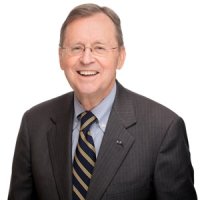A Conversation with Governor Eduardo Campos, of the Brazilian State of Pernambuco
On January 19, 2012, the Brazil Institute at the Woodrow Wilson International Center for Scholars welcomed governor Eduardo Campos, of the state of Pernambuco, to discuss the growing economic opportunities and bilateral relations. In his late forties, Governor Campos, was reelected in 2010 for a second term with a record 83 percent of the vote. A former congressman and minister of Science and Technology, he has emerged as a leading player in Brazilian national politics and a potential contender for the country’s highest job. Campos is the current president of the Brazilian Socialist Party and a key ally of President Dilma Rousseff.
Anthony Harrington, former U.S. ambassador to Brazil and chairman of the Brazil Institute Advisory Council, introduced the governor and fellow Pernambuco cabinet member Mauricio Rands. Harrington noted that after having the privilege of serving as ambassador to Brazil, “I have believed that the U.S. and Brazil have more common interests and cultural affinities then most major countries, and that we need to continue to take concrete advantage of the mutual opportunities working together, not only bilaterally but globally as well.”
Governor Campos opened his remarks by noting Brazil’s rise as an economic and political player in the world scene. “Brazil, over the last two decades, has been through very interesting times” in which the economy has struggled but has also gained strength. “It has been a time when we gained economic stability and consolidated our democracy,” he said. He credited both former presidents Fernando Henrique Cardoso and Luiz Inácio Lula da Silva for the role they played in Brazil historic transformation. Campos argued that while the global economic downturn has hurt world economies, it has offered Brazil an opportunity to differentiate itself and remain reasonably optimistic for the future. It is important to have the “capacity to understand the growing integration,” in the spectrum of the global economic downturn, which shows a coming of age in Brazil’s international relations that helps strengthen the global equilibrium.
Brazil offers a tremendous opportunity for continued international dialogue, North-South, South-South, and continued integration of Latin America, and, most importantly, a continued dialogue with the United States. The governor stressed the opportunity Brazil now has to expand bilateral relations with the United States, after a period of difficulties. Governor Campos singled out the Science Without Borders program, a federally funded initiative of the Rousseff administration that intends to send 100,000 undergraduate and graduate students from Brazil abroad, a third of them to the U.S. They will be enrolled in courses geared towards STEM: Science, Technology, Engineering, Mathematics. Continuing on education, the governor pointed towards Pernambuco’s ongoing drive for exchange programs for middle class public school students, which has send four hundred have to United States, and six hundred to Europe and Oceania.
Pernambuco is in a special moment, Campos argued. An important cultural center in Brazil’s Northeast and the region’s capital for commercial relations, Pernambuco makes up only three percent of Brazil’s economy. The state is, however, building a port complex in Suape to be one of the country’s three strategic hubs for international commerce. He predicted that within the next fifteen years, the port will have more capacity than the port of Santos in São Paulo and employ more than 50,000 workers. Furthermore, its proximity to the African cost allows for Pernambuco to strengthen ties with growing African national economies.
The governor closed by saying that “There is a new frontier in Brazil’s development that is the Northeast, which is awaiting the arrival of new opportunities and partners to sustain us through this new century, because a more equal Brazil signifies a more equal Latin America, allowing for a better world to work in and an even better world to live in.”
Drafted by Michael Darden, Program Assistant, Brazil Institute
Edited by Paulo Sotero
Speakers


Hosted By

Brazil Institute
The Brazil Institute—the only country-specific policy institution focused on Brazil in Washington—aims to deepen understanding of Brazil’s complex landscape and strengthen relations between Brazilian and US institutions across all sectors. Read more
